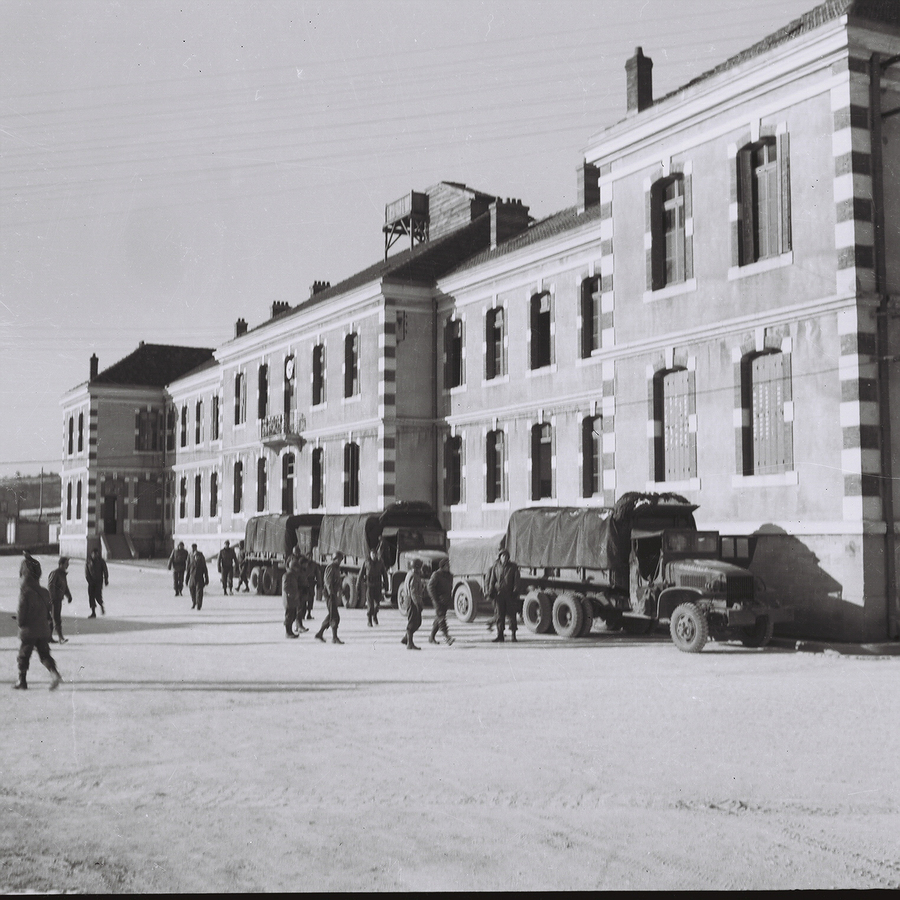The Admiral’s Estate

From the collection of Irving Mayer.
On July 8th at 1330 hours four officers and 115 E. Ms. Of the 406th crossed the I.P., departing Walton Hall and beginning their journey to the battle zone. The company was divided into a march and motor parties. The drivers and their assistants plus three officers in their jeeps composed the motor group. Lt. Kelker commanded the march party which comprised the rest of the company. Since the company’s assistant drivers were also its platoon and squad sergeants, the corporals reigned supreme in the march party. Cpl. Charles Laug acted as 1st/Sgt in the place of Jules Toth.
As the motor party went its merry way, the march party was driven to Kineton station where, after an hours wait, the train was boarded. On its way across England, the train stopped at the City of Gloucester. Here the N.A.F.I. served a spot of tea to the boys. This was quaffed amid cheers from the soldiers of the New Jersey City of Gloucester. Passing through other cities, the men saw ample evidence of the blitz in the leveled buildings.
Unofficial poop had the company heading for a marshalling area or a port of embarkation. One hundred seventeen train miles put the train in Blandford and it was “ALL OUT!” Q. M. trucks taxied the march part to Cherborough Park or as the vernacular had it, “the Admiral’s Estate.”
Albrinal Drax, the brother of Lord Dunsay, famous British author, is the owner of Charborough Park. This largest single enclosure in England was the scene of numerous skirmishes between Cromwell and the Royalists during the period of restoration. The mansion was erected in the reign of George III. It houses a valuable collection of paintings among them the famous “Stair Hall” done by Sir William Thornhill. On the grounds is a sham-gothic 18th century observation tower from which an excellent view of the channel, eight miles away, can be had.
Dusk was falling when the motor party made its appearance. The order to erect tents was given and the rest of the evening was consumed by the pitching of tents and dice. Tents were pitched pseudo-tactical inasmuch as they were not permitted on the ball diamond; the dice were pitched in accordance with the best tactics.
As often happens, the unofficial poop was wrong. The Admiral’s Estate was not a marshalling area but a stop over. Of course, it was certainly not a P.O.E. as any fool could plainly see if he climbed the observation tower and gazed at the distant channel.
The week long stay was scheduled with a light training program and athletics. The company’s soft ball team, captained by pitcher Sgt. Lefty Melenkamp, attained a string of impressive victories. The many loyal mercenary supporters of the team were well rewarded for their backing.
As all personnel was restricted, there was plenty of time to investigate and admire the estate with its forests and herds of deer. During daylight hours, the deer were extremely timid; but the “stag at eve” was bolder, knocking down tents and startling guards. Captain Rebh found it necessary to tell the men that their ammunition was to be used solely in case of enemy attack. Under no stretch of the imagination could the deer a large source of the regional meat supply, be considered an attacking agent!
At the estate an incident occurred that left a mental block in the minds of many men whenever butter was mentioned months later. One evening an extra ration of coffee was served as a midnight snack. While the line was passing the serving table, some soldiers appropriated three pounds of butter to go with their coffee. Since the total supply was but seven pounds, the three absentee blocks were immediately discovered. After a short, futile investigation, the matter was postponed until the morrow.
Right after breakfast, Captain Rebh held a company formation and related the incident of the previous night. He then told his men that he would not tolerate stealing in any form in the company and that, until the guilty were apprehended or gave themselves up, there would be no more meals served.
Dinner time came and went but the pork chops stayed in the pot. Several conferences were held by the non-coms and all material witnesses were grilled. Under the weight of evidence, one transgressor confessed. Another wayward one voluntarily returned a pound of butter which cost him three stripes and a court martial along with the first man.
Supper time found a fine meal waiting to be served when a show down inspection was suddenly ordered. Ostensibly the show down was for the three pounds of butter, but naturally none of the missing mirrors, from the recently used Blandford showers, were found in the effects of the honest and true 406 personnel.
Supper was served; the third pound is still missing and must be presumed lost.